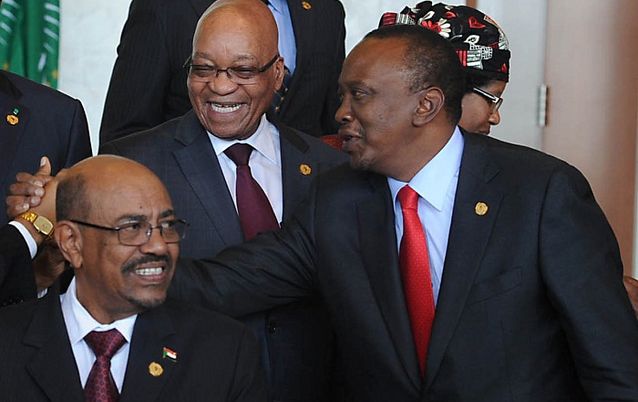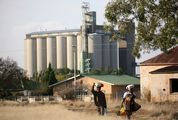IN 1964, there was ideological tension between youthful Pan Africanist Congress prisoners and the more elderly African National Congress (ANC) inmates serving sentences for political offences at Leeuwkop Prison.
Phillip Matthews, an ANC veteran, made an impassioned plea, stressing the need for unity in dealing with the enemy. But, he warned, while we could differ at the organisation level, even acrimoniously, our differences should never allow the enemy to come between us. We heard and listened. I am reminded of this as the Democratic Alliance (DA) threatens fire and brimstone if Sudan’s President Omar al-Bashir comes to these shores again this year.
The International Criminal Court (ICC) issued arrest warrants for Bashir in 2009 and 2010, accusing him of masterminding genocide and other atrocities. Countries that signed the Rome Statute of the ICC, such as SA, must act on these warrants. We did not act earlier this year and, taking the furore that followed into account, government must prepare itself.
Bashir must come, even if it unfortunately means again defying the ICC. Yes, the abuse of human rights in the Sudan cannot be overlooked but our international relationships are much more important.
Other dynamics, such as trade and investment that contribute to economic progress, come into play. We cannot arrest a sitting African head of state.
Dare we arrest him, African Union member states will demand an extraordinary meeting on whose agenda will be SA and Africa. After all, we would have defied a resolution we were part of — that Africa will ignore ICC decisions. This will affect our leadership role in Africa and our status as a major exporter and a serious investor on the continent.
Let us also look at the records of the people we are trying to impress. The UK and the US invaded Iraq on the false pretext that it had weapons of mass destruction. Today Iraq is a wasteland. Libya is also a mess, with people crossing heavy seas in makeshift boats seeking refuge. Again, no responsibility is taken by the West except to complain about these refugees, whom they created.
When major countries, including China, Russia or Brazil take an interest in our problems, they have strategic interests — it could be oil or something else. It is about time we give meaning to the concept of African self-determination and define the terms of engagement with the rest of the world, instead of always taking orders. We must also always benefit, even in the Bashir matter.
The DA is either oblivious of, or does not care about the implications of, Bashir’s arrest. Or, which I strongly believe, it is still emotionally tied to the colonial mentality and our previous masters and institutions.
Africa was not part of, or the reason for, the creation of the United Nations, the Bretton Woods institutions, and many others. Yet, despite the fact that we are now a serious reality in the global environment, the Western world still refuses to give us our rightful place at the table.
The World Trade Organisation has policies in place that see the Western world dominate world markets, and thus the advantage of trade. France blatantly ignores restrictions on government support for agriculture, disadvantaging farmers in our poorer countries. Germany will not support any decision against Russia over the Ukraine debacle. This is the geopolitical reality.
The Bashir issue gives Africa an opportunity to put its foot down, without necessarily endorsing human rights abuses. Our duty is to ensure we do not continue to rubber-stamp international accords and institutions that, in the long run, merely take us for granted and ignore our rightful place and realities. This far and no further.
• Mazwai is a former journalist and political activist

(Left to right) Sudanese President Omar al-Bashir, President Jacob Zuma and Kenyan President Uhuru Kenyatta at the African Union Summit in May 2013. Picture: GCIS
IN 1964, there was ideological tension between youthful Pan Africanist Congress prisoners and the more elderly African National Congress (ANC) inmates serving sentences for political offences at Leeuwkop Prison.
Phillip Matthews, an ANC veteran, made an impassioned plea, stressing the need for unity in dealing with the enemy. But, he warned, while we could differ at the organisation level, even acrimoniously, our differences should never allow the enemy to come between us. We heard and listened. I am reminded of this as the Democratic Alliance (DA) threatens fire and brimstone if Sudan’s President Omar al-Bashir comes to these shores again this year.
The International Criminal Court (ICC) issued arrest warrants for Bashir in 2009 and 2010, accusing him of masterminding genocide and other atrocities. Countries that signed the Rome Statute of the ICC, such as SA, must act on these warrants. We did not act earlier this year and, taking the furore that followed into account, government must prepare itself.
Bashir must come, even if it unfortunately means again defying the ICC. Yes, the abuse of human rights in the Sudan cannot be overlooked but our international relationships are much more important.
Other dynamics, such as trade and investment that contribute to economic progress, come into play. We cannot arrest a sitting African head of state.
Dare we arrest him, African Union member states will demand an extraordinary meeting on whose agenda will be SA and Africa. After all, we would have defied a resolution we were part of — that Africa will ignore ICC decisions. This will affect our leadership role in Africa and our status as a major exporter and a serious investor on the continent.
Let us also look at the records of the people we are trying to impress. The UK and the US invaded Iraq on the false pretext that it had weapons of mass destruction. Today Iraq is a wasteland. Libya is also a mess, with people crossing heavy seas in makeshift boats seeking refuge. Again, no responsibility is taken by the West except to complain about these refugees, whom they created.
When major countries, including China, Russia or Brazil take an interest in our problems, they have strategic interests — it could be oil or something else. It is about time we give meaning to the concept of African self-determination and define the terms of engagement with the rest of the world, instead of always taking orders. We must also always benefit, even in the Bashir matter.
The DA is either oblivious of, or does not care about the implications of, Bashir’s arrest. Or, which I strongly believe, it is still emotionally tied to the colonial mentality and our previous masters and institutions.
Africa was not part of, or the reason for, the creation of the United Nations, the Bretton Woods institutions, and many others. Yet, despite the fact that we are now a serious reality in the global environment, the Western world still refuses to give us our rightful place at the table.
The World Trade Organisation has policies in place that see the Western world dominate world markets, and thus the advantage of trade. France blatantly ignores restrictions on government support for agriculture, disadvantaging farmers in our poorer countries. Germany will not support any decision against Russia over the Ukraine debacle. This is the geopolitical reality.
The Bashir issue gives Africa an opportunity to put its foot down, without necessarily endorsing human rights abuses. Our duty is to ensure we do not continue to rubber-stamp international accords and institutions that, in the long run, merely take us for granted and ignore our rightful place and realities. This far and no further.
• Mazwai is a former journalist and political activist


















Change: 2.62%
Change: 2.95%
Change: 3.07%
Change: 2.37%
Change: 5.04%
Data supplied by Profile Data
Change: 1.88%
Change: 0.74%
Change: 2.62%
Change: 0.00%
Change: 0.52%
Data supplied by Profile Data
Data supplied by Profile Data
Change: -0.55%
Change: 0.64%
Change: -0.35%
Change: 0.76%
Change: 3.92%
Data supplied by Profile Data